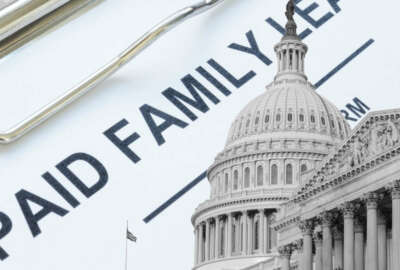

The Comprehensive Paid Leave for Federal Employees Act would give feds 12 weeks of paid family and medical leave, essentially replacing the 12 weeks of unpaid l...
A bicameral pair of Democrats renewed calls to guarantee paid time off for federal employees who are dealing with medical or family issues.
Sen. Brian Schatz (D-Hawaii) and Rep. Don Beyer (D-Va.) reintroduced the Comprehensive Paid Leave for Federal Employees Act. The bill offers up to 12 weeks of paid family and medical leave for federal employees to take care of their own health, to care for a sick family member or to take time off when a family member is called to active military duty.
Notably, this type of leave is separate from employees’ sick leave and annual leave. And the bill wouldn’t require feds to use up those other types of leave before taking advantage of the benefit. Federal employees must have worked at a federal agency for at least one year before the benefit kicks in.
The 12 weeks of paid leave under the bill would replace the 12 weeks of unpaid leave, currently guaranteed, to employees under the Family and Medical Leave Act (FMLA), which just reached its 30-year enactment milestone.
Congressional proponents of the legislation said, offering paid family and medical leave to federal employees would save the government at least $50 million annually in costs of workforce turnover.
“With federal agencies struggling to recruit and retain young talent, family-friendly policies are necessary to maintain a robust workforce,” Beyer said in a press release.
The bill currently has 10 Democrat co-sponsors between the House and Senate, along with one Republican co-sponsor in the House.
Additionally, the legislation builds on a 2019 law, that gave federal employees 12 weeks of paid parental leave for the birth, adoption of foster of a new child. Prior to that law’s enactment, federal employees were eligible for 12 weeks of unpaid parental leave under the FMLA.
“We were able to achieve a major expansion of paid parental leave for federal workers, but we still have more to do. This basic benefit for workers is even more crucial in the age of COVID, but the United States still lags the rest of the world in securing guaranteed paid leave for its full workforce,” Beyer said in a statement.
Lawmakers’ push to expand paid leave for the federal workforce, also comes just after President Joe Biden urged agencies to expand federal employees’ access, to both, paid and unpaid leave options. Particularly for federal employees with less than a year in the government, who may not have accrued much paid time off and who are not yet eligible for the FMLA.
The Comprehensive Paid Leave for Federal Employees Act was introduced last Congress, as well. But that previous iteration of the bill gained pushback during a House Oversight and Reform Committee hearing, with some Republicans raising concerns about the cost of enacting it and arguing that, federal employees already have too many workplace flexibilities. The original bill eventually cleared the committee, but it did not get to a floor vote.
Federal unions, including the National Treasury Employees Union and the National Federation of Federal Employees, quickly voiced their support for the reintroduction of the legislation.
“Too often I hear from federal workers who have exhausted their sick and annual leave to handle a major medical situation and then they have to resort to unpaid leave,” NTEU National President Tony Reardon said in a statement. “The Comprehensive Paid Leave for Federal Employees Act would eliminate the need for federal employees to choose between their family and their job.”
“As a model employer for the nation, it is in the best interest of the U.S. government to provide excellent benefits to our hard-working civil servants. Not only is it an honorable approach to supporting our public workers, but it will also save the government millions of dollars year to year in turnover and recruitment costs for outgoing employees, who are forced to leave their jobs when they fall ill or need to take care of a family member,” NFFE National President Randy Erwin said in a statement.
Copyright © 2024 Federal News Network. All rights reserved. This website is not intended for users located within the European Economic Area.
Drew Friedman is a workforce, pay and benefits reporter for Federal News Network.
Follow @dfriedmanWFED

